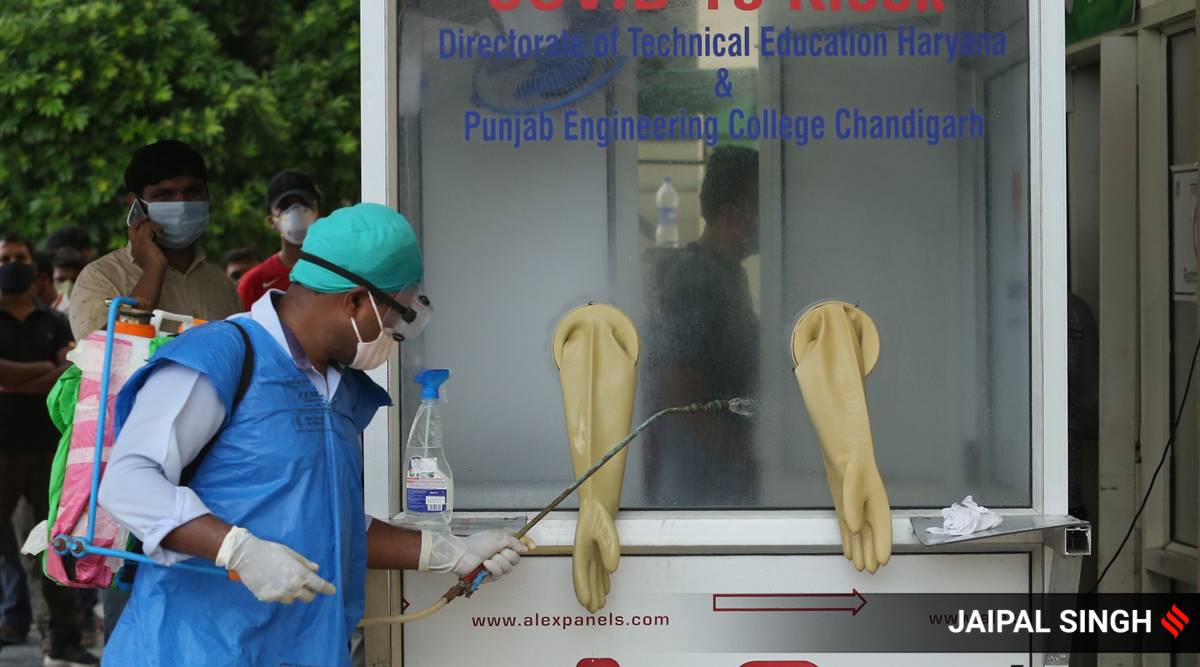 Disinfecting of COVID-19 testing kiosk at Civil hospital in Panchkula (Express photo by Jaipal Singh)
Disinfecting of COVID-19 testing kiosk at Civil hospital in Panchkula (Express photo by Jaipal Singh)With Punjab continuing to reflect the worst fatality rate of Covid-19 patients in the country, the advisor to Punjab government on Health, Medical Education and Research, Dr KK Talwar, has sounded a word of caution that the month of December will be critical in the fight against the virus and that the people should not let their guard down by ignoring precaution measures.
With the Case Fatality Rate (CFR) of Covid patients still almost double the national rate at nearly 3.2 per cent and not showing any signs of going down, the Centre has once again deputed a team of doctors to advise the state government on measures to tackle the pandemic.
Amid apprehensions of a second wave of Covid-19 infections in the state, the Punjab government Wednesday announced reimposing the night curfew form December 1, besides doubling the fine for not wearing masks and flouting social distancing norms from the present Rs 500 to Rs 1,000. The state also recorded 31 Covid-19 fatalities and 785 fresh infections in last 24 hours.
Punjab has a recovery rate of 92.5 per cent even as certain districts such as Fatehgarh Sahib, Ropar, Tarn Taran, Kapurthala and Ludhiana continue to record a very high death rate – much higher than the national average.
The issue has repeatedly come up at stock taking conferences held with the Union health ministry.
Speaking to The Indian Express, Dr Talwar said that the state government has been taking pro-active measures on managing the treatment of Covid patients.
“We are expecting a second wave and are prepared to deal with it. We have been holding discussions with medical colleges, government hospitals and private hospitals on how to manage the disease. One aspect is to use steroids but then this has to be done very carefully as it can cause damage too. We are also looking at delaying the ventilation of patients and trying to manage with oxygen support once oxygen saturation gets low. There are equipment available, which can give a higher rate of flow of oxygen,” said Dr Talwar.
Asked why the CFR has remained so high in Punjab for the past several months, Dr Talwar blamed it on carelessness on part of people, lack of tertiary medical care in some districts and co-morbidity.
“While I concede that the CFR is high but we must not forget that the death rate per million as a relation to the population of the state is low. There were shortcomings in tertiary hospital care in some districts as these were not available in government hospitals and there were no private hospitals there too but this is being addressed by the state government,” he said.
Dr Talwar said that the state has not seen the kind of spike that was expected after Diwali and other religious festivals. “We have not seen the kind of figures that we were afraid of. We have to be very careful in the month of December when it comes to expecting a peak of infections. If we are careful and observe all precautions we will manage to negotiate through December with low figures and that will be a big achievement,” he added.
Asked if the ongoing farmers’ agitation will result in a spike in Covid infections, Dr Talwar said that any large gathering where social distancing is not observed or masks are not worn will cause a spike. “We must also note that in gatherings, which take place indoors, like marriages, more precautions are needed to be taken. There is a need to wear masks at all times and maintain distance,” he said.
With regard to the virus showing any mutation in Punjab, Dr Talwar said that a study was being undertaken on this soon and that he was in the middle of arranging a tie up. “This shall not be at any extra cost to the state exchequer. We shall get an agency to look into the behaviour of the virus and give us recommendations,’ he said.
Responding to a query regarding the imposition of night curfew and whether it is effective at all due to low footfall at night, Dr Talwar said that such restrictions play a psychological role too.
“Night curfew not only reduces gatherings like marriages and social events but it also serves as a reminder to the people that we are still in the midst of a raging pandemic and that we must not be complacent,” he said.